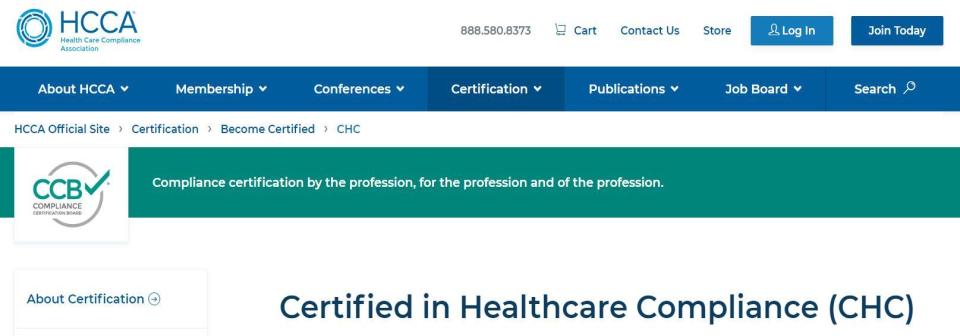Are you looking for the best compliance certifications in 2025? You’re in the right place.
An evolving business and economics landscape requires increasing expertise in legal knowledge. For both potential and currently working compliance officers, this means continuing education in the compliance realm. Luckily we have some of the best compliance certifications you can enroll in to gain that much-needed expertise.
In this article, we’ll look at the best compliance certifications and training courses you can enroll in on your way to becoming an ethics and compliance expert.
Let’s get right into it.
Best Compliance Certifications for 2025 [Reviews + Pricing]
Degrees have apparent benefits for legal professionals and policy management candidates. However, certifications have the edge in terms of relevant vocational knowledge.
Here are the top professional compliance certification courses and exams for 2025.
1. Certified Compliance & Ethics Professional (CCEP)
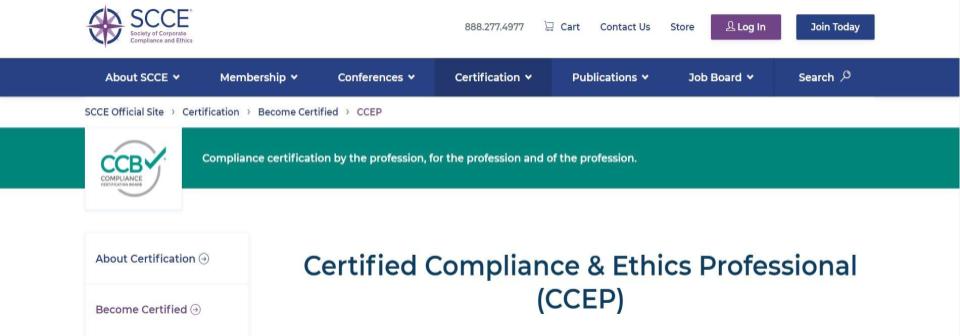
The Certified Compliance and Ethics Professional (CCEP) is an all-in-one compliance program hosted by the Compliance Certification Board (CCB).
The CCB is known for ensuring that candidates with a CCEP certification are up-to-date on the latest industry trends and can handle new and unique compliance challenges.
It’s responsible for ‘quality control’ regarding testing ethics and the candidate’s aptitude for compliance and auditing.
Students have the option of choosing an industry or specialty/niche. The Compliance Certification Board offers multiple accreditations in compliance and related principles. Some are based on overarching concepts, while others are specific to one field.
According to this certification’s eligibility criteria, you need at least a year of experience working in a compliance position.
If you want to become a compliance regulator on a global scale, you can also enroll in CCEP-I, which costs the same.
Pricing
If you are already a member of the Society of Corporate Compliance and Ethics (SSCE) or a Healthcare Compliance Association (HCCA) member, the exam will cost you $275. For nonmembers, the price is $375.
For more information and enrollment, visit the Society of Corporate Compliance & Ethics.
2. Certified Information Systems Security Professional (CISSP)
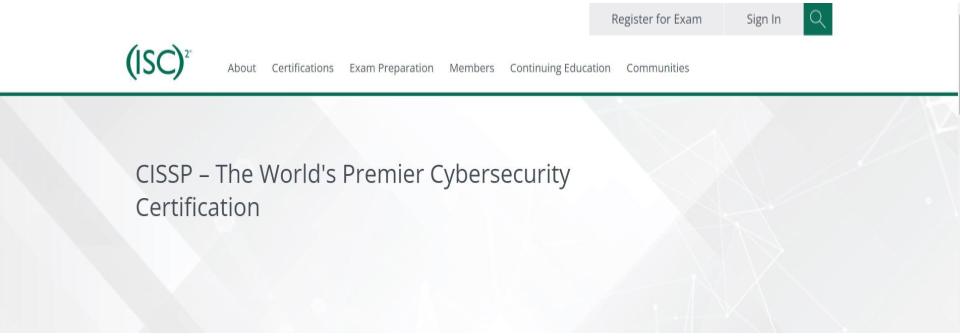
The Certified Information Systems Security Professions (CISSP) offered by ISC2 is one of the most popular compliance certifications.
Many see it as a ‘premium’ certification for cybersecurity compliance because of the broad course coverage and the institute’s recognition. The certification is popular in the United States but has been achieved worldwide by 147,000 students.
As for its scope, many IT companies consider this certification the base requirement for cybersecurity employees and compliance department individuals.
The certification lists eight main domains, two requiring a five-year practical work experience. You can also attempt the certification course with four years of experience if you have at least 16 years of education.
The CISSP certification consists of a 6-hour paper that includes 250 different questions.
Pricing
The CISSP Computer Adaptive Test (CISSP-CAT) costs $699 per exam. In an emergency, you can reschedule without penalty – but up to a limit.
For more information and enrollment, check out Certified Information Systems Security Professional (CISSP).
3. Certified Regulatory Compliance Manager (CRCM)
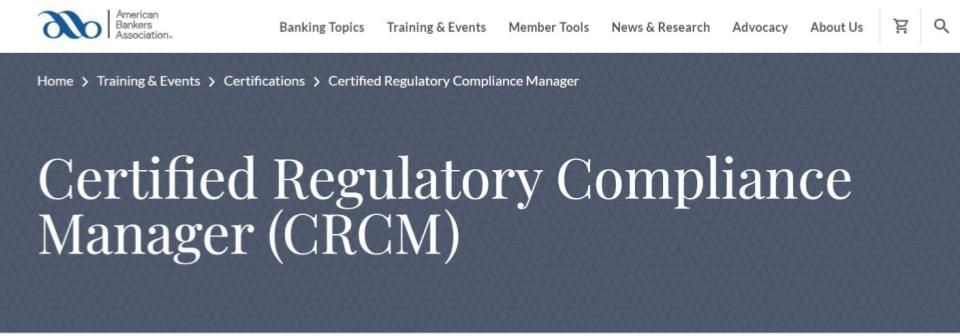 The Certified Regulatory Compliance Manager (CRCM) is an advanced certification ideal for anyone looking to work in financial and legal compliance.
The Certified Regulatory Compliance Manager (CRCM) is an advanced certification ideal for anyone looking to work in financial and legal compliance.
Banks and other financial institutions regularly have open positions for individuals with the kind of skill set this certification develops.
Being relatively advanced, CRCM requires applicants to be familiar with several regulations such as the Bank Secrecy Act (BSA), Payment Card Industry Data Security Standards (PCI), and more.
While the study material is not overly complicated, the American Bar Association (ABA, the organization offering this certification) focuses heavily on experience as a compliance professional, specifically in risk assessment.
The ABA dictates that applicants should have experience in:
- Performing general risk assessments
- Performing condition-specific risk analysis
- Conducting risk audits and examinations (specific and non-specific)
- Developing, implementing, and managing a compliance risk management plan
Like in CISSP, you must sign a Code of Ethics statement for CRCM. As for the specific experience, you need at least six years of working as a compliance professional (within the last ten years) or at least three years of experience during which you completed compliance training programs conducted by the ABA (over the previous five years).
This test is ideal for people with fewer resources who prefer to learn on the job as a compliance professional.
Pricing
This compliance certification course will cost you $750 per attempt.
For more information and enrollment, check out Certified Regulatory Compliance Manager (CRCM).
4. Certified in Risk and Information Systems Control (CRISC)

Certified in Risk and Information Systems Control (CRISC) is an ISACA certification for the modern compliance professional.
The course equips compliance officers with skills to take on complex and unique compliance issues in an evolving business climate.
The certification covers crucial elements of any IT infrastructure, such as IT risk identification, assessment, and monitoring.
CRISC requires applicants to have at least three years of experience in security program management or compliance, in at least two of the CRISC job domains.
You don’t necessarily have to complete the three years before enrolling. You should obtain it ten years before you file the application or no more than five years after passing the exam. This gives you the freedom to pursue it at your own pace.
It is a high-level exam so remember to prepare well.
Pricing
The exam fee is $595 per attempt for members of ISACA and $725 for nonmembers.
For more information and enrollment, check out Certified in Risk and Information Systems Control (CRISC).
5. Certified Information Privacy Professional (CIPP)
 The Certified Information Privacy Professional (CIPP) certification caters to compliance issues related to cybersecurity and data privacy.
The Certified Information Privacy Professional (CIPP) certification caters to compliance issues related to cybersecurity and data privacy.
Offered by the International Association of Privacy Professionals (IAPP), this certification became relevant as soon as the EU introduced strict data privacy laws for the internet.
The US adopted the EU’s General Data Protection Regulation (GDPR) policy, the California Consumer Privacy Act (CCPA) of 2018.
This certification is now recognized and accredited by the American National Standards Institute (ANSI) under ISO standard 17024:2012.
The best thing about this course is that you don’t have to spend years qualifying for the exam. Instead, IAPP only requires at least 30 hours of dedicated study time for the test.
Pricing
You will pay a $550 fee to the International Association of Privacy Professionals (IAPP).
For more information and enrollment, check out Certified Information Privacy Professional (CIPP).
6. Certified in Healthcare Compliance (CHC)
The Certified in Healthcare Compliance (CHC) is a healthcare-specific certification that deals with compliance within the medico-legal realm.
Offered by the Compliance Certification Board (CCB), a major healthcare compliance association, the CHC certification is best for upskilling existing and potential healthcare compliance officers.
Where IT companies only have to worry about Personally Identifiable Information (PII), healthcare organizations have to secure statistical data. This is one of the reasons why this certification is so valuable.
In terms of eligibility, you need at least a year’s experience working in a compliance position or 1,500 hours of compliance duties in the past two years.
You’ll also need 20 CCB continuing education units (CEUs), out of which at least ten must be from compliance training programs. You can also pay a small fee for every CEU you lack (no more than 10). It will cost you $50 per CCB CEU increase.
Pricing
The course costs $275 for CCB members and $375 for nonmembers. You will need to complete 40 CCB CEUs every two years, 20 of which must be from live training sessions to maintain your membership and certification.
If you need an extension for your exam, it will cost you $50 and will extend the date by two months. On the other hand, rechecking your test will cost you $25.
For more information and enrollment, check out Certified in Healthcare Compliance (CHC).
7. Certified Community Bank Compliance Officer (CCBCO)
 The Certified Community Bank Compliance Officer (CCBCO) is the ideal certification for business and finance students looking to monitor compliance in a company.
The Certified Community Bank Compliance Officer (CCBCO) is the ideal certification for business and finance students looking to monitor compliance in a company.
The base requirements for CCBCO are the same as the CCEP certification mentioned above.
The CCBCO is one of the best courses for community bank compliance operations and monitoring. This is great for fresh graduates looking for a job in community banks. That said, it has limited scope since it’s only suitable for community bank compliance.
During the course, you’ll learn how to develop an effective compliance program and undertake the actions required to assess and manage risk. As an ethics professional in a bank, you’ll learn how to audit any risks or liabilities associated with the bank.
Pricing
The course costs $375 to ICBA members, while nonmembers have to pay $100 extra. This cost is for the compliance program only.
For more information and enrollment, check out Certified Community Bank Compliance Officer (CCBCO).
8. Certified Anti-Money Laundering Specialist (CAMS)
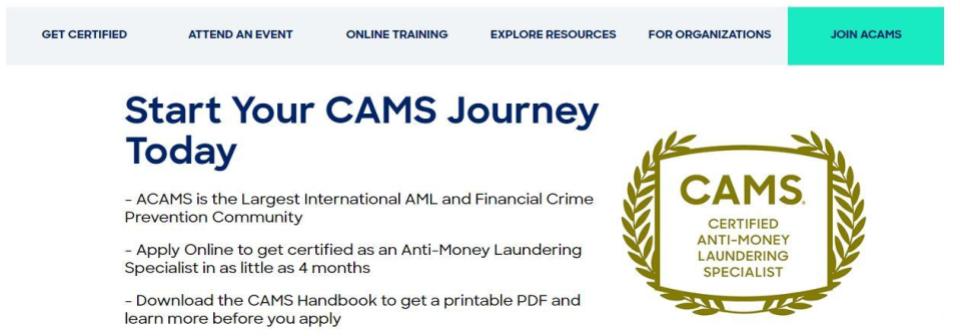
The Certified Anti-Money Laundering Specialist (CAMS) certification is perfect for anyone looking to combat financial crime.
Offered by the Association of Certified Anti-Money Laundering Specialists (ACAMS), the certification provides an in-depth look at how criminals implement financial crimes and how to prevent them.
To become eligible for the course, you need 40 ACAMs credits.
The institution calculates credits based on:
- Number of years in the financial crime prevention sector (10 ACAMS credits per year)
- Professional certifications in financial crime (10 credits per certification).
- A bachelor’s degree (20 credits)
If you don’t have enough credits, you can increase your score by attending ACAM training programs.
Pricing
The exam fee for the private sector certification (standard) is $1,695. If you want a public sector job, the specific certification fee will be $1,295. The advanced versions of the certification cost $2,180 for the private and $1,790 for the public sector courses.
For more information and enrollment, check out Certified Anti-Money Laundering Specialist (CAMS).
9. Certified Compliance Professional (CCP)
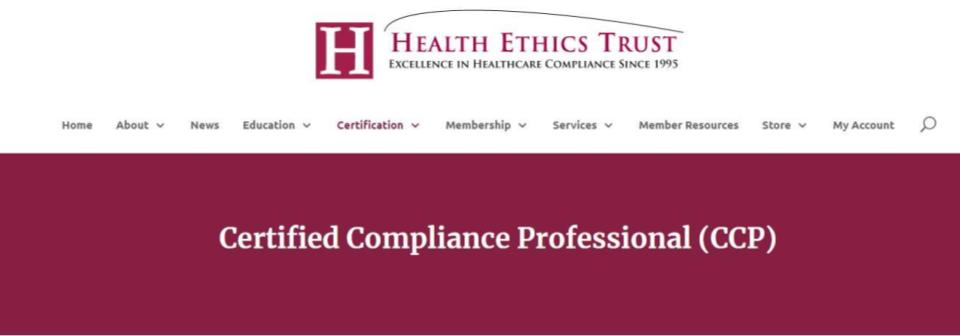 The Certified Compliance Professional (CCP) certification is a general regulatory compliance coaching program for professionals in the healthcare and finance sector.
The Certified Compliance Professional (CCP) certification is a general regulatory compliance coaching program for professionals in the healthcare and finance sector.
The Health Ethics Trust (HET) incorporates the CCP (Certified Compliance Professional) program. A close cousin of CCP is the CCE (Certified Compliance Executive) certification, which you can pursue after attaining the CCP program.
The requirements of the CCP compliance program include:
- At least a year of experience working in a full-time compliance position or 1,500 hours of direct compliance operation completed in the last two years
- 20 CCB-approved CEUs
The exam tests you on practical scenarios such as hospital management strategy, design, administration, and risk assessment.
Pricing
When applying for the exam, you can expect to pay $500 as the exam fee if you are a CCP member; $625 if you are a nonmember.
For more information and enrollment, check out Certified Compliance Professional (CCP)
10. Certified Medical Device Compliance Professional (CMDCP)
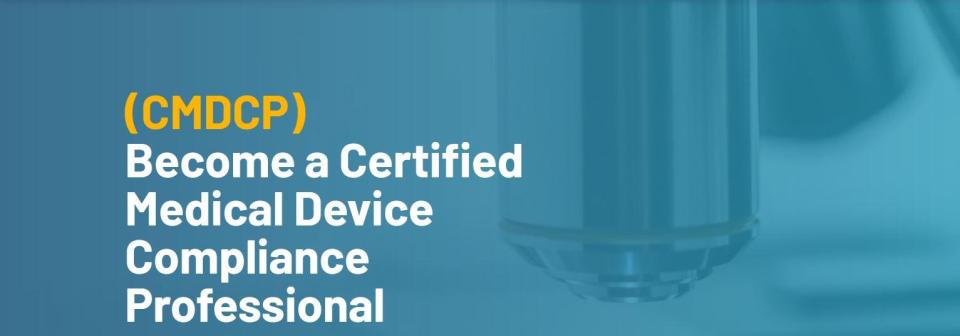 The Certified Medical Device Compliance Professional (CMDCP) certification occupies an essential niche within the medical/healthcare compliance realm.
The Certified Medical Device Compliance Professional (CMDCP) certification occupies an essential niche within the medical/healthcare compliance realm.
This lesser-known compliance program helps students ensure that the medical devices and implants comply with the relevant health and safety codes.
Prosthetic implants and artificial limbs are steadily evolving from static fixtures to fully functional bionic extensions of the body. The CMDCP certification gained popularity along with the development of new prosthetic technology.
Applicants can choose to study compliance for existing and approved medical equipment, devices in development, or clinical trial design compliance for medical devices.
To be eligible for the course, you will need to select three core courses that you can find on the ICCDP website, as well as one elective.
Pricing
Each course in the certification costs $2,150. However, the early-bird discount brings the price down to $1,950.
For more information and to enroll, check out Certified Medical Device Compliance Professional (CMDCP)
11. Certified in Healthcare Research Compliance (CHRC)
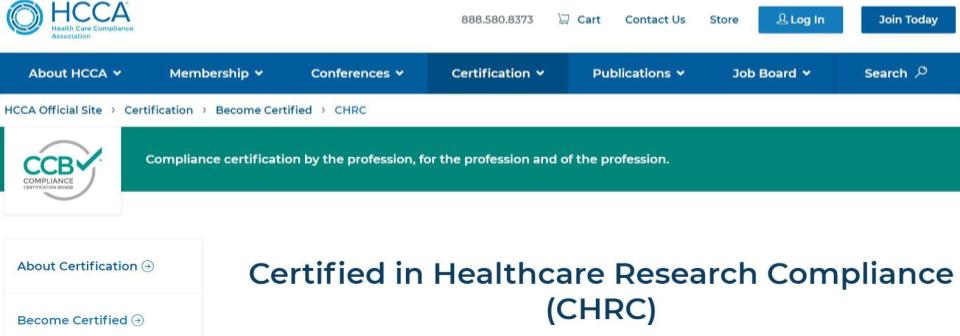 The Certified in Healthcare Research Compliance (CHRC) certification is for anyone looking to mitigate compliance risks in a challenging, high-risk environment.
The Certified in Healthcare Research Compliance (CHRC) certification is for anyone looking to mitigate compliance risks in a challenging, high-risk environment.
The program builds expertise in compliance process research and provides knowledge of relevant local, state, and federal regulations. Students learn how to understand and address legal obligations and encourage organizational integrity.
The certification remains valid for two years. Applicants need to meet the Compliance Certification Board CEU requirements. You should have at least two years of work experience in a healthcare compliance capacity.
The certification is the perfect next step from a Bachelor’s degree in corporate and regulatory compliance.
Pricing
The exam costs $275 for HCCA or SCCE members, and $375 for nonmembers. Certification renewal costs $115 for members and $225 for nonmembers.
For more information and enrollment, check out Certified in Healthcare Research Compliance.
12. Certified Professional Compliance Officer (CCPO)
 The Certified Professional Compliance Officer (CCPO) certification is part of a high-level program that addresses compliance requirements as per government regulations and laws.
The Certified Professional Compliance Officer (CCPO) certification is part of a high-level program that addresses compliance requirements as per government regulations and laws.
Backed by the American Association of Professional Coders (AACP), the CPCO certification trains medico-legal staff in developing, organizing, managing, and directing the compliance department’s functions.
The course builds an understanding of how to create, enable, and monitor a healthcare-based compliance program in your host company. It also teaches how to work as per compliance reviews, risk assessments, audits, and staff training.
Furthermore, compliance programs will eventually become a mandatory requirement for enrollment into federal healthcare programs.
The entire program consists of 150 multiple choice questions and students can retake the exam within the first year of initially passing the exam.
Pricing
The certification costs $399 for a single attempt. You have the option of one free retake within the first year. After that, each attempt costs the total price.
For more information and enrollment, check out Certified Professional Compliance Officer (CCPO).
13. Certified in the Governance of Enterprise IT (CGEIT)
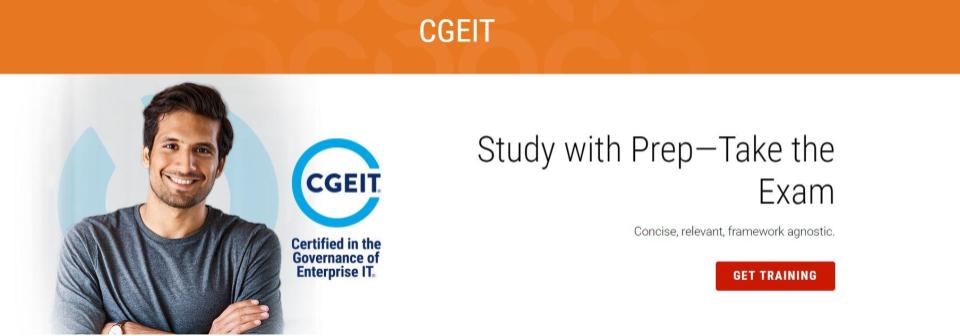 The Certified in the Governance of Enterprise IT certification is for IT professionals working within corporate IT governance and best-practice maintenance.
The Certified in the Governance of Enterprise IT certification is for IT professionals working within corporate IT governance and best-practice maintenance.
The certification is backed by the Information Systems Audit and Control Association (ISACA) and offers one of the most comprehensive curriculums in the IT compliance landscape.
The certification has four domains, namely IT resources, risk optimization, benefits realization, and governance of the enterprise. Each is its own separate niche and each contributes toward making a student a more well-rounded compliance expert.
Aside from the course material, enrolling in the CGEIT certification also gives you access to a vibrant community of alumni and compliance experts with whom you can interact and learn.
Pricing
The certification course costs $575 for ISACA members and $760 for nonmembers.
For more information and enrollment, check the Governance of Enterprise IT (CGEIT).
How to Choose the Best Compliance Certification for You in 2025
Compliance requirements are constantly changing. However, not all certifications are the same, and you need to enroll in the ones that’ll benefit you in the long run.
Here’s how you can single out the best ones for you:
- Don’t just look for the most prestigious institution when rating the best compliance certifications. Instead, find out if the certification caters to the industry you’re aiming for and whether it upskills you for the future compliance challenges in that industry.
- Some of the more advanced certifications require prior work experience. If you’re new to legal and regulatory compliance, skip over those for now and choose ones you can take directly out of college.
- Regulatory compliance requires a mix of financial, legal, and managerial knowledge. Considering that, you should look for courses that deliver the right combination of all three based on which specific professional area you hope to work in.
- Prior qualifications and experience are huge deciding factors. This is because you’re more likely to upskill yourself in an area where you’re already qualified.
- Price (relative to the knowledge provided) is another factor, albeit not very prominent. Most of the courses are affordable for the typical student. Additionally, the accrediting organizations often run discounts on all offered courses. Still, if you’re on a budget, choose a less expensive course and continue with high-level ones and
- Some certifications address local regulatory compliance requirements, while others address federal laws. Confirm which group of regulations a certification course addresses, cross-reference it with your job goals, and enroll accordingly.
In addition to the above, confirm that the certification course supports your degree and acts as a natural supplement to your existing qualifications.
Bottom Line
New compliance certifications emerge online almost every day. The sheer number of available courses can often confuse potential compliance specialists.
An example of this is the inclusivity movement. Organizations are now incorporating the Workplace Gender Equality Act into their compliance departments to spearhead which you may need the UNDP’s Gender Equality Seal Certification program.
Regardless of which one(s) you attempt, make sure to continue education for as long as the compliance requirements within the business sphere keep evolving.
Frequently Asked Questions
Here are answers to some of the most frequently asked questions about compliance certifications:
What is compliance certification?
A compliance certification is a certification that teaches businesses, compliance officers, and others about compliance management. They cover the laws in place for different industries (such as food safety), how to apply them correctly to your organization, and more.
Most organizations will want a certified compliance officer on staff because they have all of this knowledge at their fingertips.
What is the best compliance certification?
The best compliance certification will be relevant to your industry, compliance needs, and budget.
How do you become certified compliance professional?
To become a certified compliance professional, you should take a compliance certification course and pass the exam.
What types of certifications should a compliance officer hold?
The types of certification that a compliance officer can hold include a compliance management certification, regulatory compliance certificate, or cyber security training. There are also industry and regulation-specific certifications.
